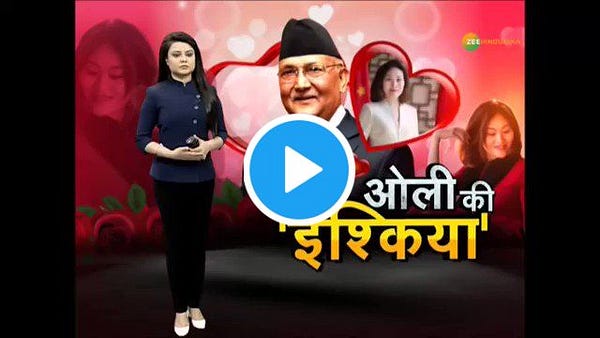
The “highly sexist and misogynistic” coverage on Indian TV of Nepalese prime minister K.P. Sharma Oli’s alleged dalliance with the Chinese ambassador to Nepal, Hou Yanqi, is not just harming India’s relationship with Nepal but also with China. And it’s time Indian policy makers took note, says a leading Nepalese intellectual.
“Rather than think of this as something that demeans the Nepali nation-state, have Indian policy makers sat back and thought, ‘Does this also hurt our relationship with China because we are not only targeting the PM of Nepal but the formal plenipotentiary representative of Beijing in Kathmandu?’” asks Kanak Mani Dixit, the well-regarded founder of the magazine Himal Southasian.
As India squared off with China at the border, and squabbled with Nepal over a recent map, Hindi TV channels dished out salacious gossip of the 68-year-old Nepalese PM being “honey trapped” by the Chinese Ambassador, 50.
Zee Hindustan, owned by BJP MP Subhash Chandra, called the Urdu-speaking Ambassador, a vishakanya (venomous girl).
Such coverage resulted in a blockade of Indian channels by Nepalese cable TV operators last week.
In a full-length episode of J-POD, the journalism podcast, Kanak Mani Dixit, who has long championed the South Asian cause, says the tendentious coverage not just denigrates an elected PM of the Nepalese nation-state but also denigrates the Chinese.
“It was extremely demeaning and insulting. Just because you dislike K.P. Oli, you cannot go roughshod over him and over all the Nepali sensitivities that attach to the Nepali nation-state. This is the point about Indian exceptionalism that Indian TV anchors just don’t seem to get.
“What Indian TV wallahs, political analysts, social scientists and policy makers do not realise is that the Nepalese public is actually consuming what you are producing. When you produce something that is ultra-nationalistic for your audience, for your TRPs, for your government’s sense of self, it is creating an equal and opposite reaction in Nepal. This does not happen to the same extent in Pakistan or Bangladesh or Sri Lanka.
“You are creating not a force-multiplier for India but a force-subtractor when all this excessively violent language comes up…. The market is being fed poison.”
Dixit says China is make the same mistake as India in Nepal—interventionism—and India is beginning to exhibit what he calls “Indian Exceptionalism”.
India under Modi: ‘civilisational distress’
Kanak Mani Dixit, 64, who did his graduation in India (his classmates were former Chief Justices, Deepak Misra and Ranjan Gogoi), says the lumpenisation of Indian politics that began during the Emergency under Indira Gandhi has gained pace under Narendra Modi.
“The way India is going right now is a matter of civilisational distress.”
“I was a student at Delhi University during the Emergency, during its implementation and release. From that point on we have seen a slow deceleration of Indian democracy, and an acceleration of that deceleration in the time of Narendra Modi. There is a lumpenisation of politics in India in a way that Indira Gandhi under Emergency could never have implemented because she didn’t have that network, and even if she wanted to, the Congress party cadre may not have followed her. But you have the RSS and the Hindutva brigade in every mohalla in most parts of India and that is where the top-down message is so so dangerous and divisive and negative that it goes right to the capillaries. It creates political power, it creates silencing.
“The way India is going right now is a matter of civilisational distress because of the individualised, collective, cumulative distress of so many individuals. Everything is seen from the perspective of an ultra-rightist Hindutva-laced ideology that is actually running the state right now. I would compare what Trump’s USA is going through a parallel crisis and Modi’s India.
“A whole new reality is being created which then becomes the new reality, the horrific new normal. The accidents that lie ahead are seen in the accidents we have already seen, just pre-COVID, and which are probably set to resume after the pandemic trails away.”
Why India was surprised at Galwan
“The shock and surprise of the Indian masses at what happened in Galwan is partly because Indian media and policymakers have been overly focused on a weaker partner, Pakistan, forgetting that the real dragon, China, is out there and waiting.”
India-Nepal ties under Narendra Modi
“There has not been this bad a relationship, at the state-to-state level, and this much out in the open. I don’t know in the modern era if it has ever been this poor. Relations has never been this bad, but you could also say it could not get any worse.”
Why India and Nepal have drifted apart
“The blockade of the Indo-Nepal border at all points for five months, not the first but the most excruciating, was enough to create enormous illwill within Nepal towards India. That memory lingers. The Indian media should keep in mind that the acceleration towards China was triggered by the blockade.”
Nepal not an abject recipient of largesse
“Nepal sends more remittances to India, from Indian citizens working in Nepal, than vice-versa. Nepal is helping sustain some of the weakest parts of India which have been neglected by New Delhi. The poorest of the poor who come from Poorvanchal, Bihar, Odisha are sending back income to the very poorest communities in India.”
Narendra Modi doesn’t have time
“The Eminent Persons Group appointed by the respective PMs, comprising diplomats, scholars and political scientists, worked for two years to sort out issues. What has happened to the EPG study? It is gathering dust. For the last two years, Modi and his office have not found the time to simply receive the EPG report.”
Also read: ‘Indian TV is not a force-multiplier but a force-subtractor’
Listen to the full podcast with Kanak Mani Dixit:
Like what you see? Give us a shout. Don’t? Tell us why. Have a tip? Mail us.
Spread the word about The Net Paper, the world’s first social media juicepaper.














Share this post